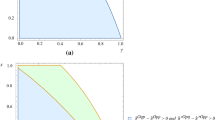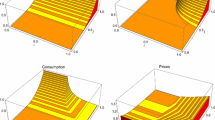Abstract.
This paper considers the optimum taxes and tariffs in a multi-commodity setting. Using the argument in Ramawami (1968), I show that when all goods and factors are tradable, the home country should buy out all the foreign factors. Conditions for the optimal terms of trade are also analyzed. In a single consumption good model, the foreign factors should be bought out at the foreign autarky prices. This result is only partially true in the more general setting. While factor mobility should be prohibited before the buy-out, non-prohibitive tariffs have to be imposed on trade in goods to attain the optimum terms of trade.
Similar content being viewed by others
Author information
Authors and Affiliations
Corresponding author
Rights and permissions
About this article
Cite this article
Wong, Sk. The Ramaswami Argument in a Multi-commodity Setting. J Econ 84, 157–178 (2005). https://doi.org/10.1007/s00712-004-0099-1
Received:
Revised:
Published:
Issue Date:
DOI: https://doi.org/10.1007/s00712-004-0099-1




